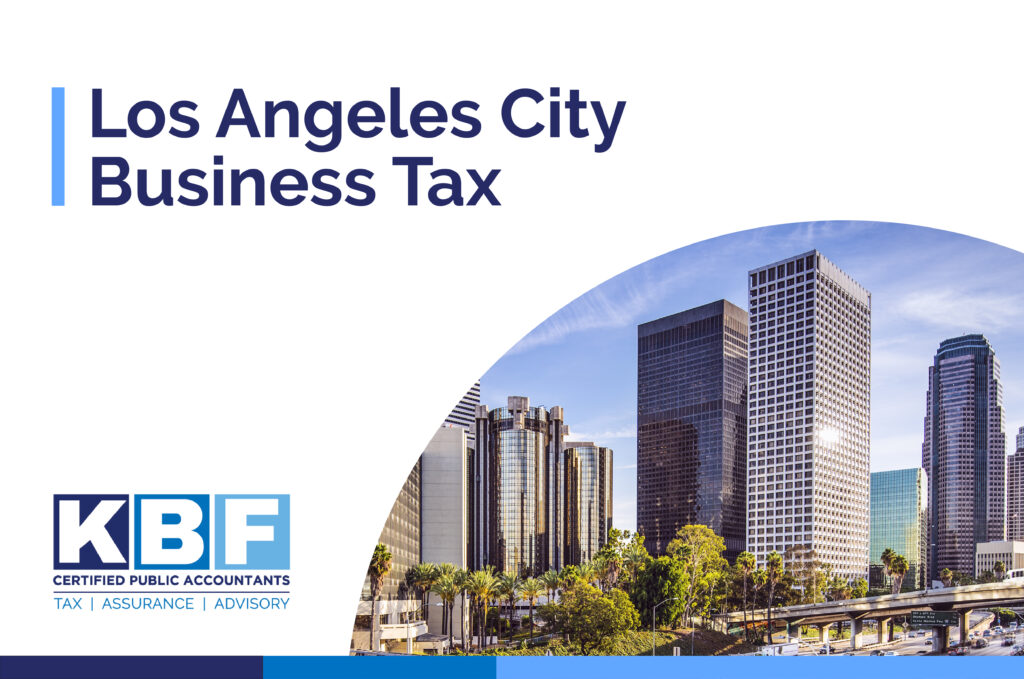

Companies and individuals doing business in the City of Los Angeles and its neighboring cities may find themselves subject to the annual Los Angeles City Business Tax (LACBT), due on February 28, 2023.
With work-from-home arrangements becoming more common, along with broad nexus standards, companies may find themselves unexpectedly triggering a filing obligation or increasing/decreasing their level of business activity in Los Angeles. A voluntary disclosure program is available for companies that are subject to the tax but have not yet registered.
The LACBT is a business license tax levied on those who do business in the city of Los Angeles (City). The license tax is a gross receipts-based tax levied against taxpayers who live in the city or conduct business there.
The threshold for being considered “engaged in business in the City” may be lower than the traditional income tax nexus. A person is considered engaged in business if he/she:
Companies may have employees working remotely within Los Angeles. If such presence is treated as satisfying the qualifications noted above, a company may be subject to the LACBT. The City taxing jurisdiction is not limited to the incorporated City of Los Angeles; it extends to various cities located within the boundaries of Los Angeles County.
The LACBT is generally imposed at a rate ranging from 0.1% to 6.0% on all gross receipts earned in the City by a taxpayer. The tax rate is determined by a taxpayer’s business tax classification, with many taxpayers falling within the “professions and occupations” category, which has a rate of 0.425% for the 2023 filing. The “professions and occupations” category is a catch-all for taxpayers who do not fit into any of the other tax classifications.
LACBT Renewal
To maintain good standing with the City, taxpayers must file the annual renewal by February 28, 2023. The gross receipts measure is based on the prior calendar year’s apportioned gross receipts. The relatively short time frame between the end of the typical taxpayer’s calendar year and the reporting deadline can pose compliance challenges for taxpayers.
A 45-day extension may be granted by the Director of Finance upon written request. To avoid late filing penalties, a minimum of 90% of the tax must be paid by the original due date of February 28 if an extension request is granted.
The LACBT applies only to gross receipts deemed to be attributable to business activities conducted in the City. The methodology used to apportion gross receipts varies depending on the taxpayer’s classification. Gross receipts are apportioned using a cost-of-performance type methodology for taxpayers in the general “professions and occupations” category, with certain adjustments to the basis of gross receipts depending on the location of certain supporting activities such as accounting, billing, collection, and administration activities.
Los Angeles City Voluntary Disclosure Agreement
With the broad nexus standards, taxpayers may be treated as engaged in business in the City and may be unaware of their LACBT filing obligation. If a taxpayer does not have a City business tax license and the City has not yet identified the taxpayer, the taxpayer may be eligible to enter into a voluntary disclosure agreement (VDA) with the City. A VDA requires a taxpayer to remit taxes and interest for up to six years (depending on when the taxpayer began doing business in the City) and waives any underpayment penalties, which rise to 40% of the unpaid tax liability after four months of delinquency.
If you have any questions regarding the requirements for filing, please contact us for additional information.